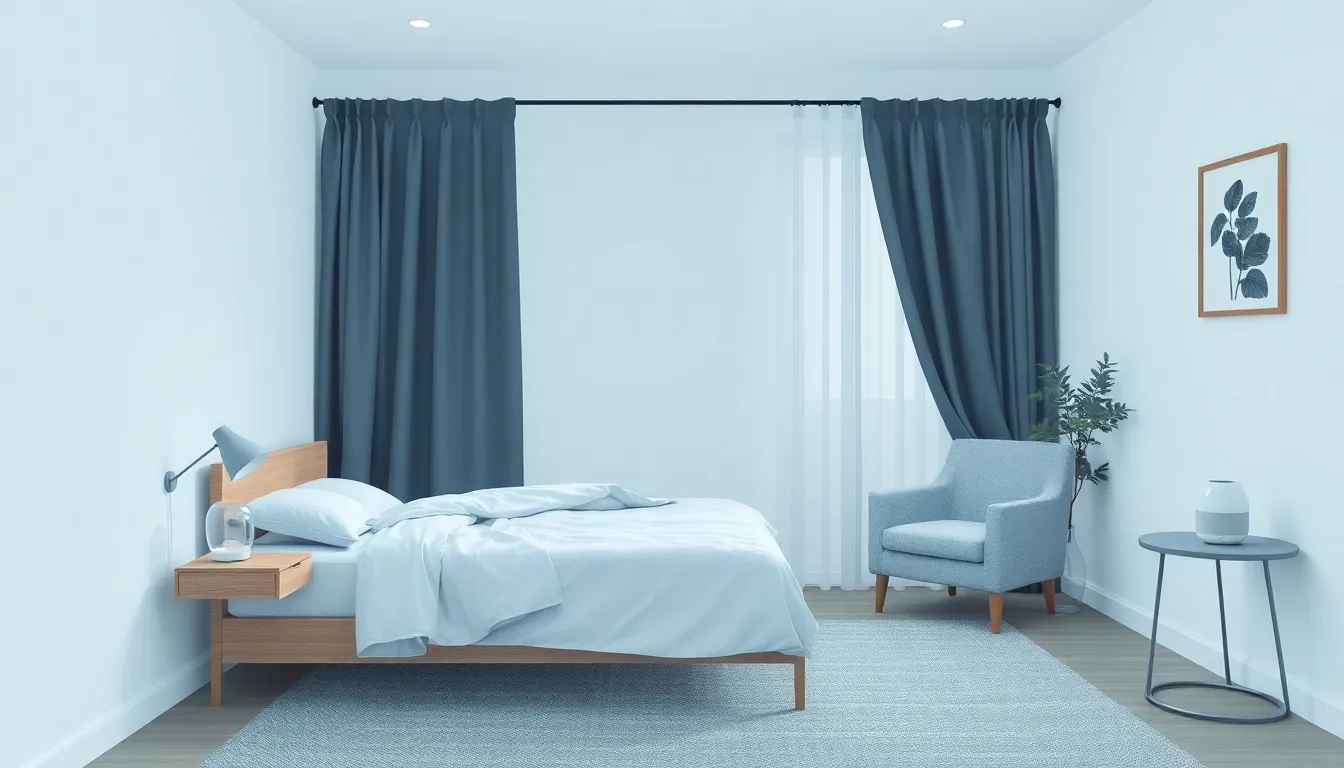Table of Contents
ToggleIn a world buzzing with distractions and endless to-do lists, finding a peaceful night’s sleep can feel like searching for a unicorn. Yet, that elusive slumber isn’t just a dream—it’s a necessity for a healthier, happier life. Imagine waking up feeling refreshed, energized, and ready to conquer the day, instead of resembling a grumpy bear who just woke from hibernation.
Sleep isn’t just about clocking hours; it’s about the quality of those hours. With the right tips and tricks, anyone can transform their bedtime routine into a sanctuary of serenity. So grab your favorite pillow and prepare to dive into the art of sleeping peacefully. After all, who wouldn’t want to trade tossing and turning for sweet dreams and restful nights?
Understanding Sleep Peacefully
Achieving peaceful sleep is crucial for overall health. Quality sleep reduces stress and enhances daily functioning.
Importance of Quality Sleep
Quality sleep plays a significant role in physical and mental health. It supports immune function, reduces the risk of chronic diseases, and enhances mood. Sufficient sleep improves cognitive performance, allowing for better decision-making and problem-solving skills. Research indicates adults need seven to nine hours of good sleep per night. Consistent restful sleep also fosters emotional resilience and aids in maintaining a healthy weight.
Factors Affecting Sleep Quality
Multiple factors influence sleep quality significantly. Environmental disturbances, like noise and light, disrupt the sleep process. Stress and anxiety create mental distractions that hinder restful phases of sleep. Lifestyle choices, such as caffeine consumption or irregular sleep schedules, impact the body’s natural rhythms. Additionally, medical conditions, including sleep apnea or chronic pain, lead to frequent awakenings. Understanding these factors helps in creating strategies to optimize sleep.
Tips for Creating a Sleep-Friendly Environment

Creating a sleep-friendly environment is essential for attaining restful sleep. Several factors contribute to a peaceful atmosphere conducive to quality rest.
Optimal Bedroom Setup
A well-organized bedroom promotes better sleep. Keep bedding comfortable, choosing materials like cotton or bamboo that enhance comfort levels. Position the bed away from distractions, especially electronics. Maintain a cool temperature, ideally between 60°F and 67°F, to optimize sleep quality. Use calming colors like soft blues or greens to create a soothing ambiance. Invest in blackout curtains to block unwanted light and ensure a dark room. Create a clutter-free zone to eliminate stress triggers and enhance relaxation.
Reducing Noise and Light
Minimizing noise and light exposure is critical for deep sleep. Consider using white noise machines or fans to mask disruptive sounds from outside. Noise-reducing curtains can also help lower ambient noise levels. Utilize sleep masks to block light that may interfere with sleep cycles. Cover windows with blackout shades to further reduce external light sources. Dimmer switches can adjust room brightness for relaxation before bedtime. Prioritizing a quiet, dark environment consistently supports healthier sleep patterns.
Relaxation Techniques for Better Sleep
Relaxation techniques enhance sleep quality by reducing stress and promoting a tranquil mind and body.
Breathing Exercises
Breathing exercises offer an effective way to alleviate tension and prepare for sleep. Practicing deep breathing creates a sense of calm. Inhale slowly for a count of five, hold for a count of two, then exhale for a count of five. Repeating this cycle several times lowers heart rate and encourages relaxation. Research shows that focusing on breath lessens anxiety, allowing for a smoother transition to sleep. Integrating a few minutes of these exercises into the bedtime routine enhances the likelihood of peaceful rest.
Mindfulness and Meditation
Mindfulness and meditation teach individuals to remain present and centered. Engaging in these practices reduces racing thoughts that disrupt sleep. Setting aside 10 to 15 minutes for meditation before bed fosters a serene state. Concentrating on bodily sensations or guided imagery cultivates a sense of tranquility. Studies show that regular mindfulness practice can improve sleep quality significantly by easing stress levels. Incorporating this technique into daily routines instills a lasting calming effect, leading to better sleep outcomes.
The Role of Sleep Hygiene
Maintaining proper sleep hygiene plays a crucial role in achieving restful sleep. It encompasses practices that foster a healthy sleep environment and promote nightly rituals.
Establishing a Nighttime Routine
Creating a consistent nighttime routine enhances sleep quality. Engaging in calming activities signals the body that it’s time to wind down. Practicing relaxation techniques like reading or gentle stretching helps ease tension. Dimming the lights several hours before bed encourages the body to produce melatonin. Establishing a set bedtime and wake time, even on weekends, regulates the body’s internal clock. Implementing this structure fosters a more reliable sleep-wake cycle.
Avoiding Sleep Disruptors
Identifying and eliminating sleep disruptors significantly improves rest. Reducing screen time before bed prevents blue light exposure, which interferes with melatonin production. Caffeine intake in the afternoon can hinder the ability to fall asleep, so it’s wise to limit consumption. Alcohol may seem to promote sleep initially but disrupts it later in the night. Additionally, ensuring the bedroom environment is free from loud noises and bright lights supports uninterrupted slumber. Maintaining a comfortable sleep temperature aids in falling asleep faster and staying asleep longer.
Achieving peaceful sleep is essential for overall health and well-being. By prioritizing a calming environment and adopting effective relaxation techniques, individuals can significantly enhance their sleep quality. Establishing a consistent nighttime routine helps signal the body to wind down, while mindful practices like deep breathing and meditation create a serene mindset.
Avoiding common sleep disruptors and maintaining an optimal bedroom setup further contribute to restful nights. With dedication to these strategies, anyone can experience the rejuvenating benefits of quality sleep, leading to improved daily functioning and a healthier lifestyle. Embracing these changes paves the way for a more peaceful and fulfilling life.




